Organisational Behaviour Report: A David & Co. Limited Analysis
VerifiedAdded on 2020/10/22
|17
|5113
|220
Report
AI Summary
This report delves into the realm of organisational behaviour, focusing on the influence of culture, politics, and power on individual and team performance within A David & Co. Limited, a UK-based fresh food company. It critically analyzes the impact of power dynamics, political climates, and various cultural frameworks on employee behaviour and productivity. Furthermore, the report evaluates content and process theories of motivation, including Maslow's Hierarchy of Needs, Herzberg's Two-Factor Theory, and others, along with motivational techniques to achieve organizational goals. It contrasts effective and ineffective team dynamics and explores team development theories to support dynamic cooperation. The report concludes with recommendations for fostering a positive organisational culture, promoting employee motivation, and enhancing overall performance, thereby offering valuable insights for leadership management.
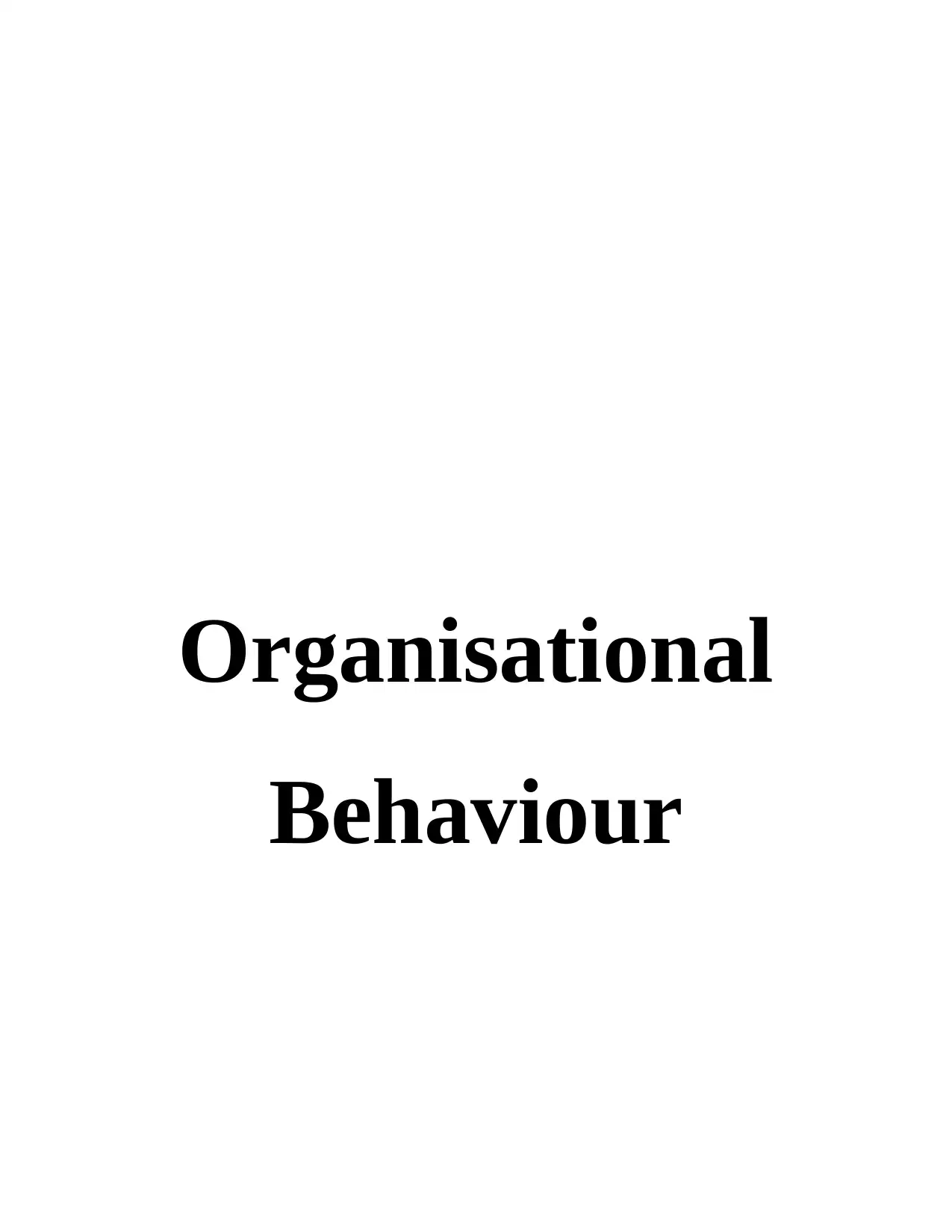
Organisational
Behaviour
Behaviour
Paraphrase This Document
Need a fresh take? Get an instant paraphrase of this document with our AI Paraphraser
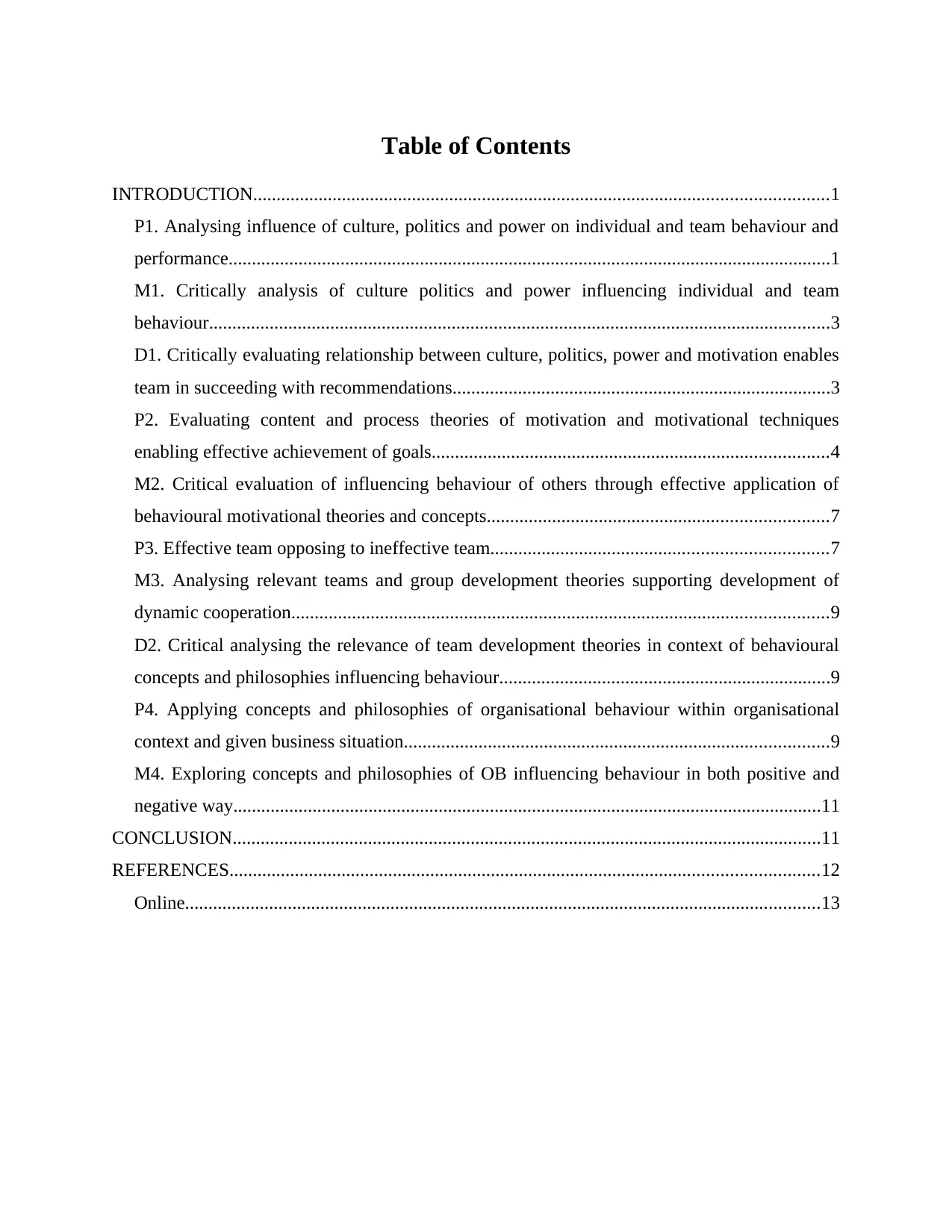
Table of Contents
INTRODUCTION...........................................................................................................................1
P1. Analysing influence of culture, politics and power on individual and team behaviour and
performance.................................................................................................................................1
M1. Critically analysis of culture politics and power influencing individual and team
behaviour.....................................................................................................................................3
D1. Critically evaluating relationship between culture, politics, power and motivation enables
team in succeeding with recommendations.................................................................................3
P2. Evaluating content and process theories of motivation and motivational techniques
enabling effective achievement of goals.....................................................................................4
M2. Critical evaluation of influencing behaviour of others through effective application of
behavioural motivational theories and concepts.........................................................................7
P3. Effective team opposing to ineffective team........................................................................7
M3. Analysing relevant teams and group development theories supporting development of
dynamic cooperation...................................................................................................................9
D2. Critical analysing the relevance of team development theories in context of behavioural
concepts and philosophies influencing behaviour.......................................................................9
P4. Applying concepts and philosophies of organisational behaviour within organisational
context and given business situation...........................................................................................9
M4. Exploring concepts and philosophies of OB influencing behaviour in both positive and
negative way..............................................................................................................................11
CONCLUSION..............................................................................................................................11
REFERENCES..............................................................................................................................12
Online........................................................................................................................................13
INTRODUCTION...........................................................................................................................1
P1. Analysing influence of culture, politics and power on individual and team behaviour and
performance.................................................................................................................................1
M1. Critically analysis of culture politics and power influencing individual and team
behaviour.....................................................................................................................................3
D1. Critically evaluating relationship between culture, politics, power and motivation enables
team in succeeding with recommendations.................................................................................3
P2. Evaluating content and process theories of motivation and motivational techniques
enabling effective achievement of goals.....................................................................................4
M2. Critical evaluation of influencing behaviour of others through effective application of
behavioural motivational theories and concepts.........................................................................7
P3. Effective team opposing to ineffective team........................................................................7
M3. Analysing relevant teams and group development theories supporting development of
dynamic cooperation...................................................................................................................9
D2. Critical analysing the relevance of team development theories in context of behavioural
concepts and philosophies influencing behaviour.......................................................................9
P4. Applying concepts and philosophies of organisational behaviour within organisational
context and given business situation...........................................................................................9
M4. Exploring concepts and philosophies of OB influencing behaviour in both positive and
negative way..............................................................................................................................11
CONCLUSION..............................................................................................................................11
REFERENCES..............................................................................................................................12
Online........................................................................................................................................13
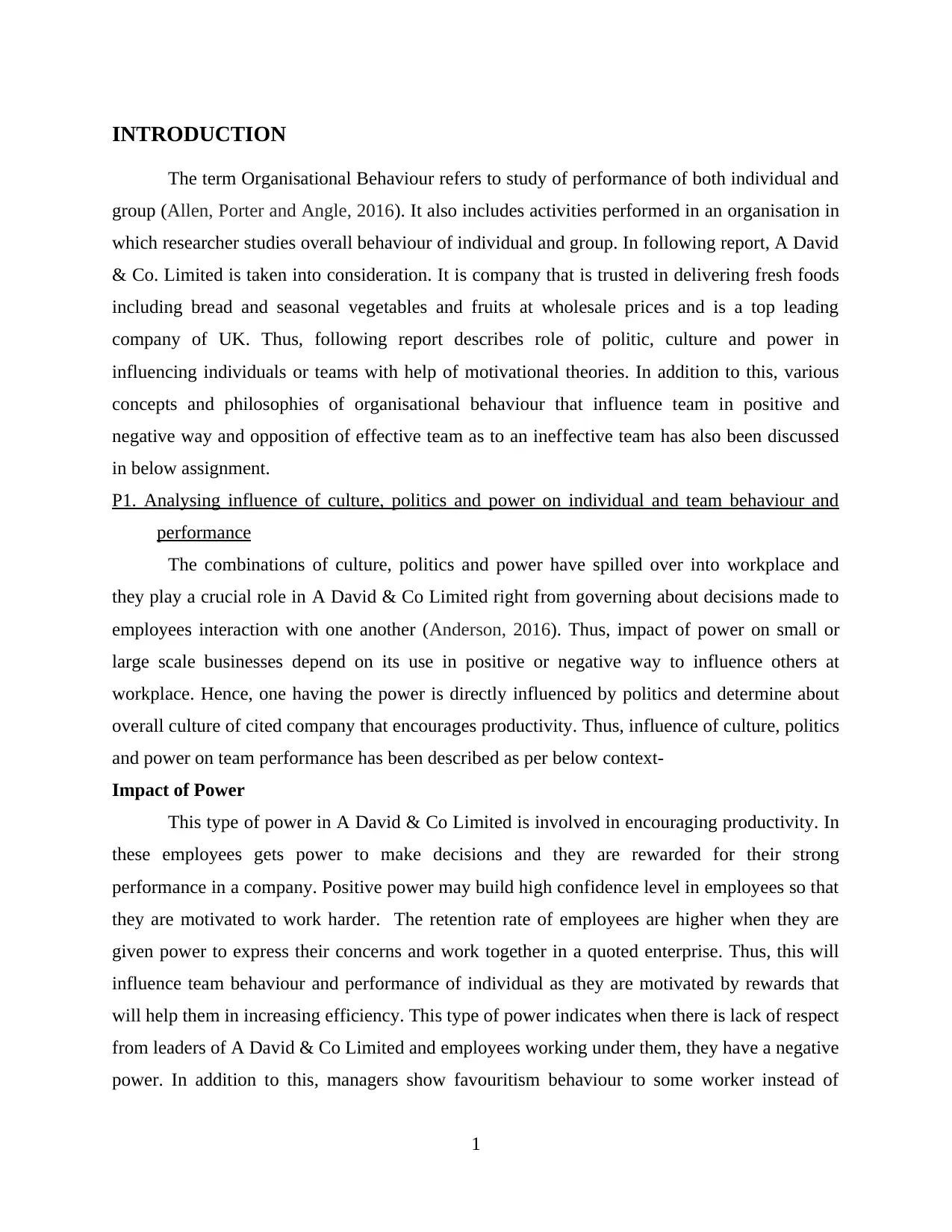
INTRODUCTION
The term Organisational Behaviour refers to study of performance of both individual and
group (Allen, Porter and Angle, 2016). It also includes activities performed in an organisation in
which researcher studies overall behaviour of individual and group. In following report, A David
& Co. Limited is taken into consideration. It is company that is trusted in delivering fresh foods
including bread and seasonal vegetables and fruits at wholesale prices and is a top leading
company of UK. Thus, following report describes role of politic, culture and power in
influencing individuals or teams with help of motivational theories. In addition to this, various
concepts and philosophies of organisational behaviour that influence team in positive and
negative way and opposition of effective team as to an ineffective team has also been discussed
in below assignment.
P1. Analysing influence of culture, politics and power on individual and team behaviour and
performance
The combinations of culture, politics and power have spilled over into workplace and
they play a crucial role in A David & Co Limited right from governing about decisions made to
employees interaction with one another (Anderson, 2016). Thus, impact of power on small or
large scale businesses depend on its use in positive or negative way to influence others at
workplace. Hence, one having the power is directly influenced by politics and determine about
overall culture of cited company that encourages productivity. Thus, influence of culture, politics
and power on team performance has been described as per below context-
Impact of Power
This type of power in A David & Co Limited is involved in encouraging productivity. In
these employees gets power to make decisions and they are rewarded for their strong
performance in a company. Positive power may build high confidence level in employees so that
they are motivated to work harder. The retention rate of employees are higher when they are
given power to express their concerns and work together in a quoted enterprise. Thus, this will
influence team behaviour and performance of individual as they are motivated by rewards that
will help them in increasing efficiency. This type of power indicates when there is lack of respect
from leaders of A David & Co Limited and employees working under them, they have a negative
power. In addition to this, managers show favouritism behaviour to some worker instead of
1
The term Organisational Behaviour refers to study of performance of both individual and
group (Allen, Porter and Angle, 2016). It also includes activities performed in an organisation in
which researcher studies overall behaviour of individual and group. In following report, A David
& Co. Limited is taken into consideration. It is company that is trusted in delivering fresh foods
including bread and seasonal vegetables and fruits at wholesale prices and is a top leading
company of UK. Thus, following report describes role of politic, culture and power in
influencing individuals or teams with help of motivational theories. In addition to this, various
concepts and philosophies of organisational behaviour that influence team in positive and
negative way and opposition of effective team as to an ineffective team has also been discussed
in below assignment.
P1. Analysing influence of culture, politics and power on individual and team behaviour and
performance
The combinations of culture, politics and power have spilled over into workplace and
they play a crucial role in A David & Co Limited right from governing about decisions made to
employees interaction with one another (Anderson, 2016). Thus, impact of power on small or
large scale businesses depend on its use in positive or negative way to influence others at
workplace. Hence, one having the power is directly influenced by politics and determine about
overall culture of cited company that encourages productivity. Thus, influence of culture, politics
and power on team performance has been described as per below context-
Impact of Power
This type of power in A David & Co Limited is involved in encouraging productivity. In
these employees gets power to make decisions and they are rewarded for their strong
performance in a company. Positive power may build high confidence level in employees so that
they are motivated to work harder. The retention rate of employees are higher when they are
given power to express their concerns and work together in a quoted enterprise. Thus, this will
influence team behaviour and performance of individual as they are motivated by rewards that
will help them in increasing efficiency. This type of power indicates when there is lack of respect
from leaders of A David & Co Limited and employees working under them, they have a negative
power. In addition to this, managers show favouritism behaviour to some worker instead of
1
⊘ This is a preview!⊘
Do you want full access?
Subscribe today to unlock all pages.

Trusted by 1+ million students worldwide
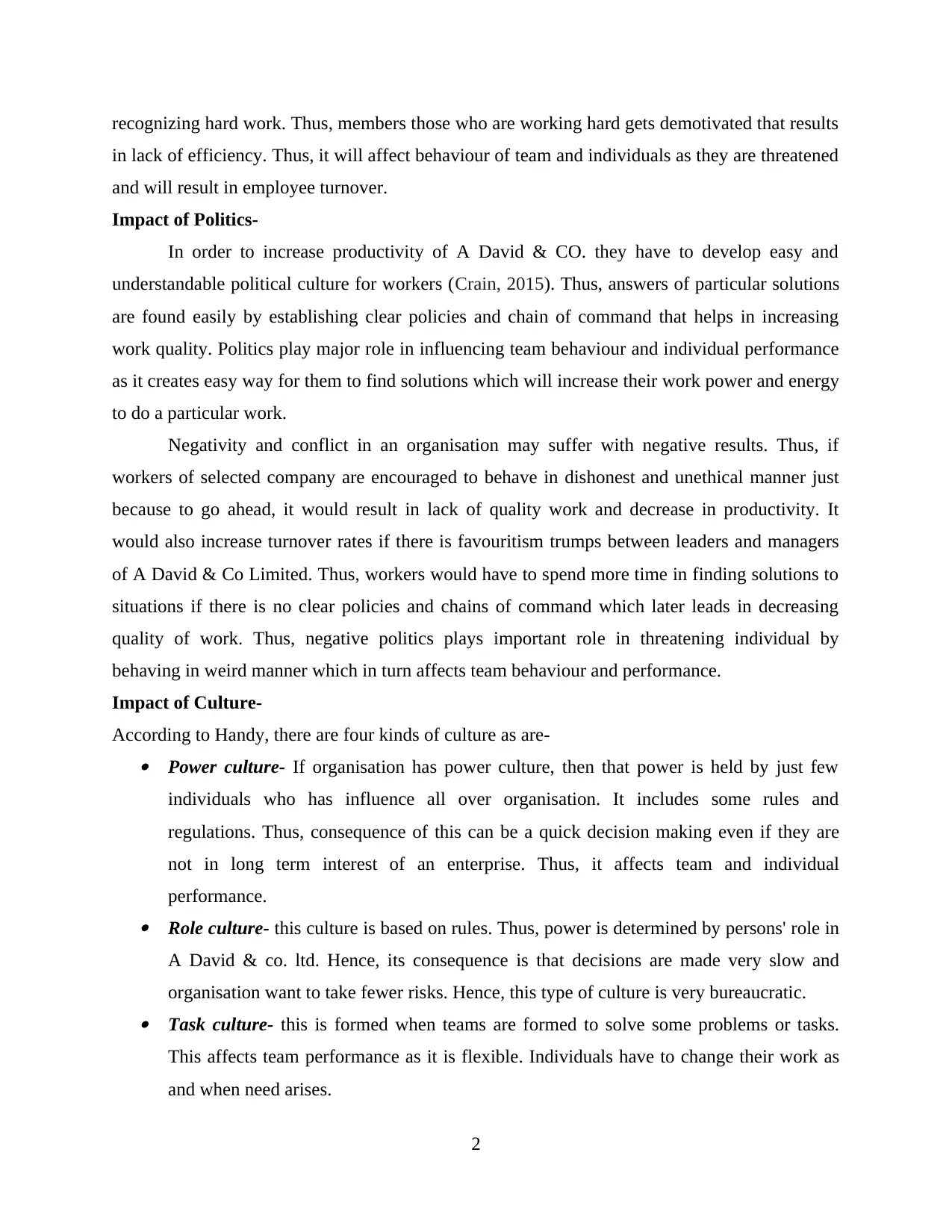
recognizing hard work. Thus, members those who are working hard gets demotivated that results
in lack of efficiency. Thus, it will affect behaviour of team and individuals as they are threatened
and will result in employee turnover.
Impact of Politics-
In order to increase productivity of A David & CO. they have to develop easy and
understandable political culture for workers (Crain, 2015). Thus, answers of particular solutions
are found easily by establishing clear policies and chain of command that helps in increasing
work quality. Politics play major role in influencing team behaviour and individual performance
as it creates easy way for them to find solutions which will increase their work power and energy
to do a particular work.
Negativity and conflict in an organisation may suffer with negative results. Thus, if
workers of selected company are encouraged to behave in dishonest and unethical manner just
because to go ahead, it would result in lack of quality work and decrease in productivity. It
would also increase turnover rates if there is favouritism trumps between leaders and managers
of A David & Co Limited. Thus, workers would have to spend more time in finding solutions to
situations if there is no clear policies and chains of command which later leads in decreasing
quality of work. Thus, negative politics plays important role in threatening individual by
behaving in weird manner which in turn affects team behaviour and performance.
Impact of Culture-
According to Handy, there are four kinds of culture as are- Power culture- If organisation has power culture, then that power is held by just few
individuals who has influence all over organisation. It includes some rules and
regulations. Thus, consequence of this can be a quick decision making even if they are
not in long term interest of an enterprise. Thus, it affects team and individual
performance. Role culture- this culture is based on rules. Thus, power is determined by persons' role in
A David & co. ltd. Hence, its consequence is that decisions are made very slow and
organisation want to take fewer risks. Hence, this type of culture is very bureaucratic. Task culture- this is formed when teams are formed to solve some problems or tasks.
This affects team performance as it is flexible. Individuals have to change their work as
and when need arises.
2
in lack of efficiency. Thus, it will affect behaviour of team and individuals as they are threatened
and will result in employee turnover.
Impact of Politics-
In order to increase productivity of A David & CO. they have to develop easy and
understandable political culture for workers (Crain, 2015). Thus, answers of particular solutions
are found easily by establishing clear policies and chain of command that helps in increasing
work quality. Politics play major role in influencing team behaviour and individual performance
as it creates easy way for them to find solutions which will increase their work power and energy
to do a particular work.
Negativity and conflict in an organisation may suffer with negative results. Thus, if
workers of selected company are encouraged to behave in dishonest and unethical manner just
because to go ahead, it would result in lack of quality work and decrease in productivity. It
would also increase turnover rates if there is favouritism trumps between leaders and managers
of A David & Co Limited. Thus, workers would have to spend more time in finding solutions to
situations if there is no clear policies and chains of command which later leads in decreasing
quality of work. Thus, negative politics plays important role in threatening individual by
behaving in weird manner which in turn affects team behaviour and performance.
Impact of Culture-
According to Handy, there are four kinds of culture as are- Power culture- If organisation has power culture, then that power is held by just few
individuals who has influence all over organisation. It includes some rules and
regulations. Thus, consequence of this can be a quick decision making even if they are
not in long term interest of an enterprise. Thus, it affects team and individual
performance. Role culture- this culture is based on rules. Thus, power is determined by persons' role in
A David & co. ltd. Hence, its consequence is that decisions are made very slow and
organisation want to take fewer risks. Hence, this type of culture is very bureaucratic. Task culture- this is formed when teams are formed to solve some problems or tasks.
This affects team performance as it is flexible. Individuals have to change their work as
and when need arises.
2
Paraphrase This Document
Need a fresh take? Get an instant paraphrase of this document with our AI Paraphraser
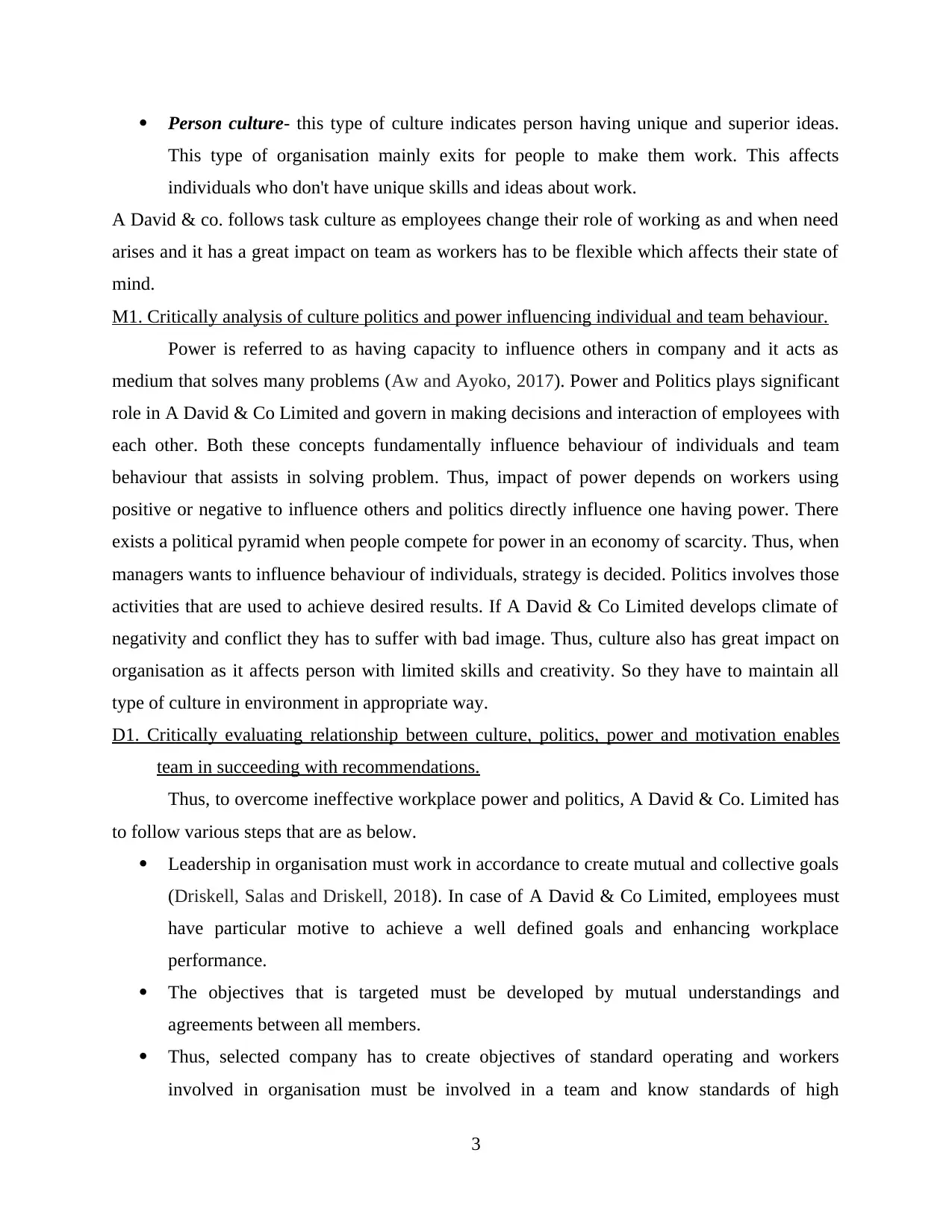
Person culture- this type of culture indicates person having unique and superior ideas.
This type of organisation mainly exits for people to make them work. This affects
individuals who don't have unique skills and ideas about work.
A David & co. follows task culture as employees change their role of working as and when need
arises and it has a great impact on team as workers has to be flexible which affects their state of
mind.
M1. Critically analysis of culture politics and power influencing individual and team behaviour.
Power is referred to as having capacity to influence others in company and it acts as
medium that solves many problems (Aw and Ayoko, 2017). Power and Politics plays significant
role in A David & Co Limited and govern in making decisions and interaction of employees with
each other. Both these concepts fundamentally influence behaviour of individuals and team
behaviour that assists in solving problem. Thus, impact of power depends on workers using
positive or negative to influence others and politics directly influence one having power. There
exists a political pyramid when people compete for power in an economy of scarcity. Thus, when
managers wants to influence behaviour of individuals, strategy is decided. Politics involves those
activities that are used to achieve desired results. If A David & Co Limited develops climate of
negativity and conflict they has to suffer with bad image. Thus, culture also has great impact on
organisation as it affects person with limited skills and creativity. So they have to maintain all
type of culture in environment in appropriate way.
D1. Critically evaluating relationship between culture, politics, power and motivation enables
team in succeeding with recommendations.
Thus, to overcome ineffective workplace power and politics, A David & Co. Limited has
to follow various steps that are as below.
Leadership in organisation must work in accordance to create mutual and collective goals
(Driskell, Salas and Driskell, 2018). In case of A David & Co Limited, employees must
have particular motive to achieve a well defined goals and enhancing workplace
performance.
The objectives that is targeted must be developed by mutual understandings and
agreements between all members.
Thus, selected company has to create objectives of standard operating and workers
involved in organisation must be involved in a team and know standards of high
3
This type of organisation mainly exits for people to make them work. This affects
individuals who don't have unique skills and ideas about work.
A David & co. follows task culture as employees change their role of working as and when need
arises and it has a great impact on team as workers has to be flexible which affects their state of
mind.
M1. Critically analysis of culture politics and power influencing individual and team behaviour.
Power is referred to as having capacity to influence others in company and it acts as
medium that solves many problems (Aw and Ayoko, 2017). Power and Politics plays significant
role in A David & Co Limited and govern in making decisions and interaction of employees with
each other. Both these concepts fundamentally influence behaviour of individuals and team
behaviour that assists in solving problem. Thus, impact of power depends on workers using
positive or negative to influence others and politics directly influence one having power. There
exists a political pyramid when people compete for power in an economy of scarcity. Thus, when
managers wants to influence behaviour of individuals, strategy is decided. Politics involves those
activities that are used to achieve desired results. If A David & Co Limited develops climate of
negativity and conflict they has to suffer with bad image. Thus, culture also has great impact on
organisation as it affects person with limited skills and creativity. So they have to maintain all
type of culture in environment in appropriate way.
D1. Critically evaluating relationship between culture, politics, power and motivation enables
team in succeeding with recommendations.
Thus, to overcome ineffective workplace power and politics, A David & Co. Limited has
to follow various steps that are as below.
Leadership in organisation must work in accordance to create mutual and collective goals
(Driskell, Salas and Driskell, 2018). In case of A David & Co Limited, employees must
have particular motive to achieve a well defined goals and enhancing workplace
performance.
The objectives that is targeted must be developed by mutual understandings and
agreements between all members.
Thus, selected company has to create objectives of standard operating and workers
involved in organisation must be involved in a team and know standards of high
3
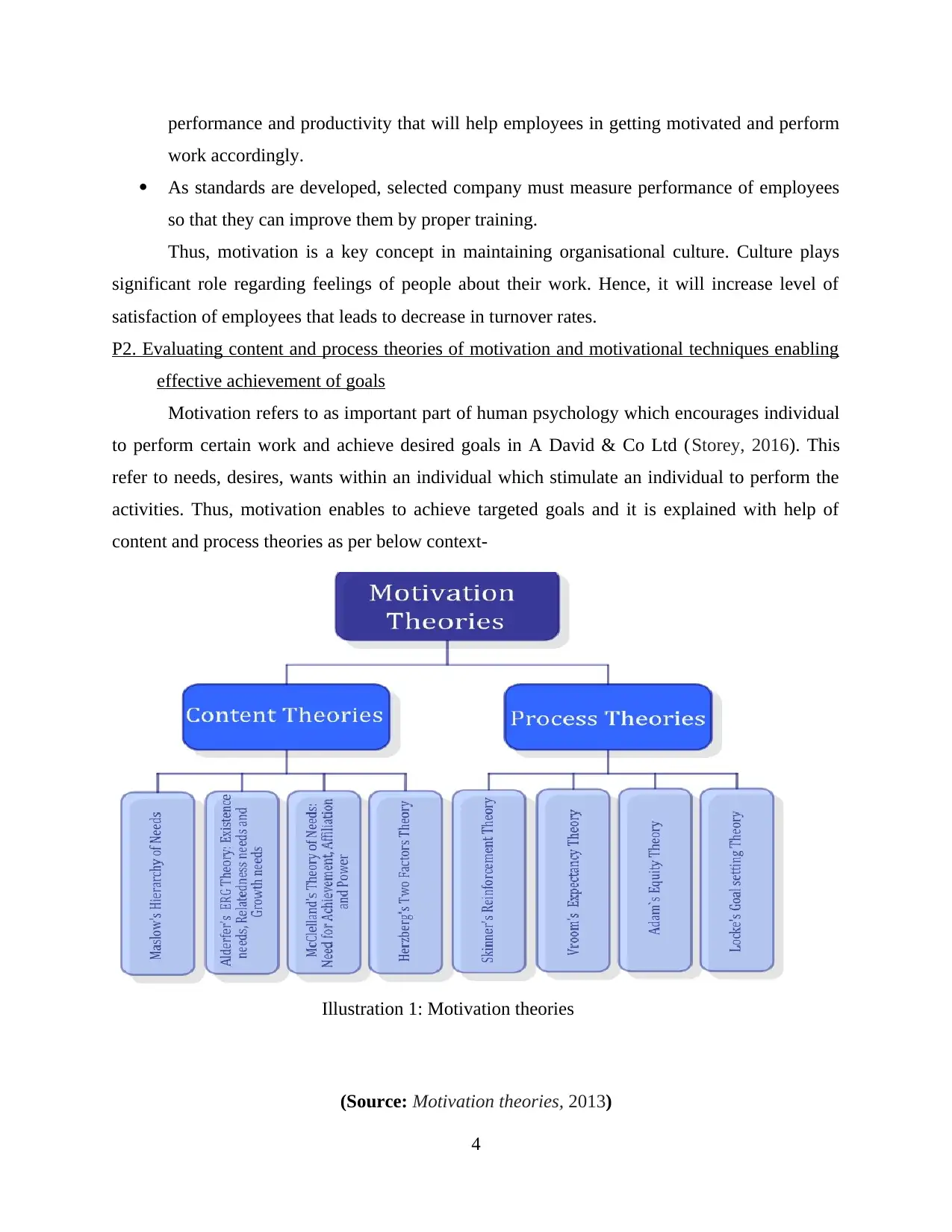
performance and productivity that will help employees in getting motivated and perform
work accordingly.
As standards are developed, selected company must measure performance of employees
so that they can improve them by proper training.
Thus, motivation is a key concept in maintaining organisational culture. Culture plays
significant role regarding feelings of people about their work. Hence, it will increase level of
satisfaction of employees that leads to decrease in turnover rates.
P2. Evaluating content and process theories of motivation and motivational techniques enabling
effective achievement of goals
Motivation refers to as important part of human psychology which encourages individual
to perform certain work and achieve desired goals in A David & Co Ltd (Storey, 2016). This
refer to needs, desires, wants within an individual which stimulate an individual to perform the
activities. Thus, motivation enables to achieve targeted goals and it is explained with help of
content and process theories as per below context-
Illustration 1: Motivation theories
(Source: Motivation theories, 2013)
4
work accordingly.
As standards are developed, selected company must measure performance of employees
so that they can improve them by proper training.
Thus, motivation is a key concept in maintaining organisational culture. Culture plays
significant role regarding feelings of people about their work. Hence, it will increase level of
satisfaction of employees that leads to decrease in turnover rates.
P2. Evaluating content and process theories of motivation and motivational techniques enabling
effective achievement of goals
Motivation refers to as important part of human psychology which encourages individual
to perform certain work and achieve desired goals in A David & Co Ltd (Storey, 2016). This
refer to needs, desires, wants within an individual which stimulate an individual to perform the
activities. Thus, motivation enables to achieve targeted goals and it is explained with help of
content and process theories as per below context-
Illustration 1: Motivation theories
(Source: Motivation theories, 2013)
4
⊘ This is a preview!⊘
Do you want full access?
Subscribe today to unlock all pages.

Trusted by 1+ million students worldwide
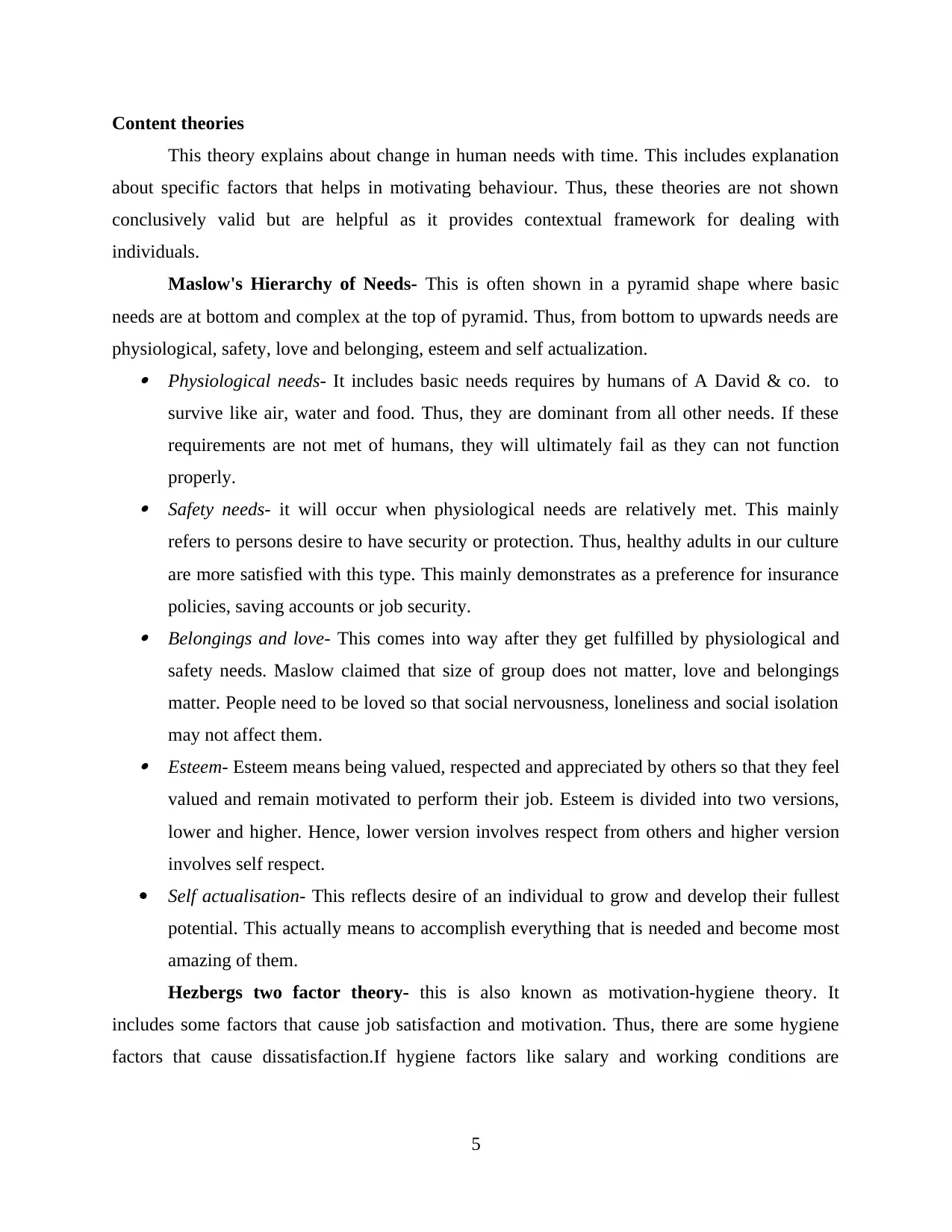
Content theories
This theory explains about change in human needs with time. This includes explanation
about specific factors that helps in motivating behaviour. Thus, these theories are not shown
conclusively valid but are helpful as it provides contextual framework for dealing with
individuals.
Maslow's Hierarchy of Needs- This is often shown in a pyramid shape where basic
needs are at bottom and complex at the top of pyramid. Thus, from bottom to upwards needs are
physiological, safety, love and belonging, esteem and self actualization. Physiological needs- It includes basic needs requires by humans of A David & co. to
survive like air, water and food. Thus, they are dominant from all other needs. If these
requirements are not met of humans, they will ultimately fail as they can not function
properly. Safety needs- it will occur when physiological needs are relatively met. This mainly
refers to persons desire to have security or protection. Thus, healthy adults in our culture
are more satisfied with this type. This mainly demonstrates as a preference for insurance
policies, saving accounts or job security. Belongings and love- This comes into way after they get fulfilled by physiological and
safety needs. Maslow claimed that size of group does not matter, love and belongings
matter. People need to be loved so that social nervousness, loneliness and social isolation
may not affect them. Esteem- Esteem means being valued, respected and appreciated by others so that they feel
valued and remain motivated to perform their job. Esteem is divided into two versions,
lower and higher. Hence, lower version involves respect from others and higher version
involves self respect.
Self actualisation- This reflects desire of an individual to grow and develop their fullest
potential. This actually means to accomplish everything that is needed and become most
amazing of them.
Hezbergs two factor theory- this is also known as motivation-hygiene theory. It
includes some factors that cause job satisfaction and motivation. Thus, there are some hygiene
factors that cause dissatisfaction.If hygiene factors like salary and working conditions are
5
This theory explains about change in human needs with time. This includes explanation
about specific factors that helps in motivating behaviour. Thus, these theories are not shown
conclusively valid but are helpful as it provides contextual framework for dealing with
individuals.
Maslow's Hierarchy of Needs- This is often shown in a pyramid shape where basic
needs are at bottom and complex at the top of pyramid. Thus, from bottom to upwards needs are
physiological, safety, love and belonging, esteem and self actualization. Physiological needs- It includes basic needs requires by humans of A David & co. to
survive like air, water and food. Thus, they are dominant from all other needs. If these
requirements are not met of humans, they will ultimately fail as they can not function
properly. Safety needs- it will occur when physiological needs are relatively met. This mainly
refers to persons desire to have security or protection. Thus, healthy adults in our culture
are more satisfied with this type. This mainly demonstrates as a preference for insurance
policies, saving accounts or job security. Belongings and love- This comes into way after they get fulfilled by physiological and
safety needs. Maslow claimed that size of group does not matter, love and belongings
matter. People need to be loved so that social nervousness, loneliness and social isolation
may not affect them. Esteem- Esteem means being valued, respected and appreciated by others so that they feel
valued and remain motivated to perform their job. Esteem is divided into two versions,
lower and higher. Hence, lower version involves respect from others and higher version
involves self respect.
Self actualisation- This reflects desire of an individual to grow and develop their fullest
potential. This actually means to accomplish everything that is needed and become most
amazing of them.
Hezbergs two factor theory- this is also known as motivation-hygiene theory. It
includes some factors that cause job satisfaction and motivation. Thus, there are some hygiene
factors that cause dissatisfaction.If hygiene factors like salary and working conditions are
5
Paraphrase This Document
Need a fresh take? Get an instant paraphrase of this document with our AI Paraphraser
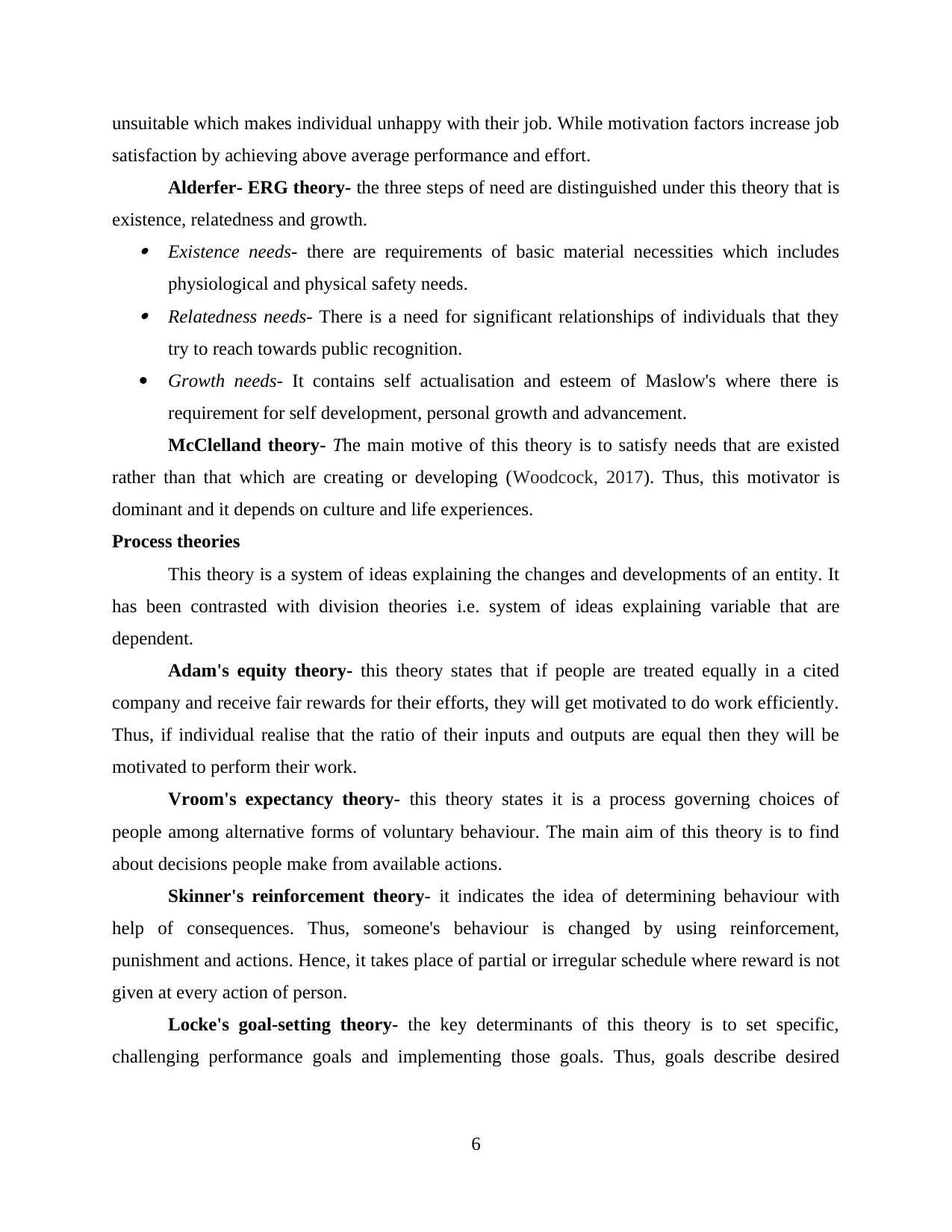
unsuitable which makes individual unhappy with their job. While motivation factors increase job
satisfaction by achieving above average performance and effort.
Alderfer- ERG theory- the three steps of need are distinguished under this theory that is
existence, relatedness and growth. Existence needs- there are requirements of basic material necessities which includes
physiological and physical safety needs. Relatedness needs- There is a need for significant relationships of individuals that they
try to reach towards public recognition.
Growth needs- It contains self actualisation and esteem of Maslow's where there is
requirement for self development, personal growth and advancement.
McClelland theory- The main motive of this theory is to satisfy needs that are existed
rather than that which are creating or developing (Woodcock, 2017). Thus, this motivator is
dominant and it depends on culture and life experiences.
Process theories
This theory is a system of ideas explaining the changes and developments of an entity. It
has been contrasted with division theories i.e. system of ideas explaining variable that are
dependent.
Adam's equity theory- this theory states that if people are treated equally in a cited
company and receive fair rewards for their efforts, they will get motivated to do work efficiently.
Thus, if individual realise that the ratio of their inputs and outputs are equal then they will be
motivated to perform their work.
Vroom's expectancy theory- this theory states it is a process governing choices of
people among alternative forms of voluntary behaviour. The main aim of this theory is to find
about decisions people make from available actions.
Skinner's reinforcement theory- it indicates the idea of determining behaviour with
help of consequences. Thus, someone's behaviour is changed by using reinforcement,
punishment and actions. Hence, it takes place of partial or irregular schedule where reward is not
given at every action of person.
Locke's goal-setting theory- the key determinants of this theory is to set specific,
challenging performance goals and implementing those goals. Thus, goals describe desired
6
satisfaction by achieving above average performance and effort.
Alderfer- ERG theory- the three steps of need are distinguished under this theory that is
existence, relatedness and growth. Existence needs- there are requirements of basic material necessities which includes
physiological and physical safety needs. Relatedness needs- There is a need for significant relationships of individuals that they
try to reach towards public recognition.
Growth needs- It contains self actualisation and esteem of Maslow's where there is
requirement for self development, personal growth and advancement.
McClelland theory- The main motive of this theory is to satisfy needs that are existed
rather than that which are creating or developing (Woodcock, 2017). Thus, this motivator is
dominant and it depends on culture and life experiences.
Process theories
This theory is a system of ideas explaining the changes and developments of an entity. It
has been contrasted with division theories i.e. system of ideas explaining variable that are
dependent.
Adam's equity theory- this theory states that if people are treated equally in a cited
company and receive fair rewards for their efforts, they will get motivated to do work efficiently.
Thus, if individual realise that the ratio of their inputs and outputs are equal then they will be
motivated to perform their work.
Vroom's expectancy theory- this theory states it is a process governing choices of
people among alternative forms of voluntary behaviour. The main aim of this theory is to find
about decisions people make from available actions.
Skinner's reinforcement theory- it indicates the idea of determining behaviour with
help of consequences. Thus, someone's behaviour is changed by using reinforcement,
punishment and actions. Hence, it takes place of partial or irregular schedule where reward is not
given at every action of person.
Locke's goal-setting theory- the key determinants of this theory is to set specific,
challenging performance goals and implementing those goals. Thus, goals describe desired
6
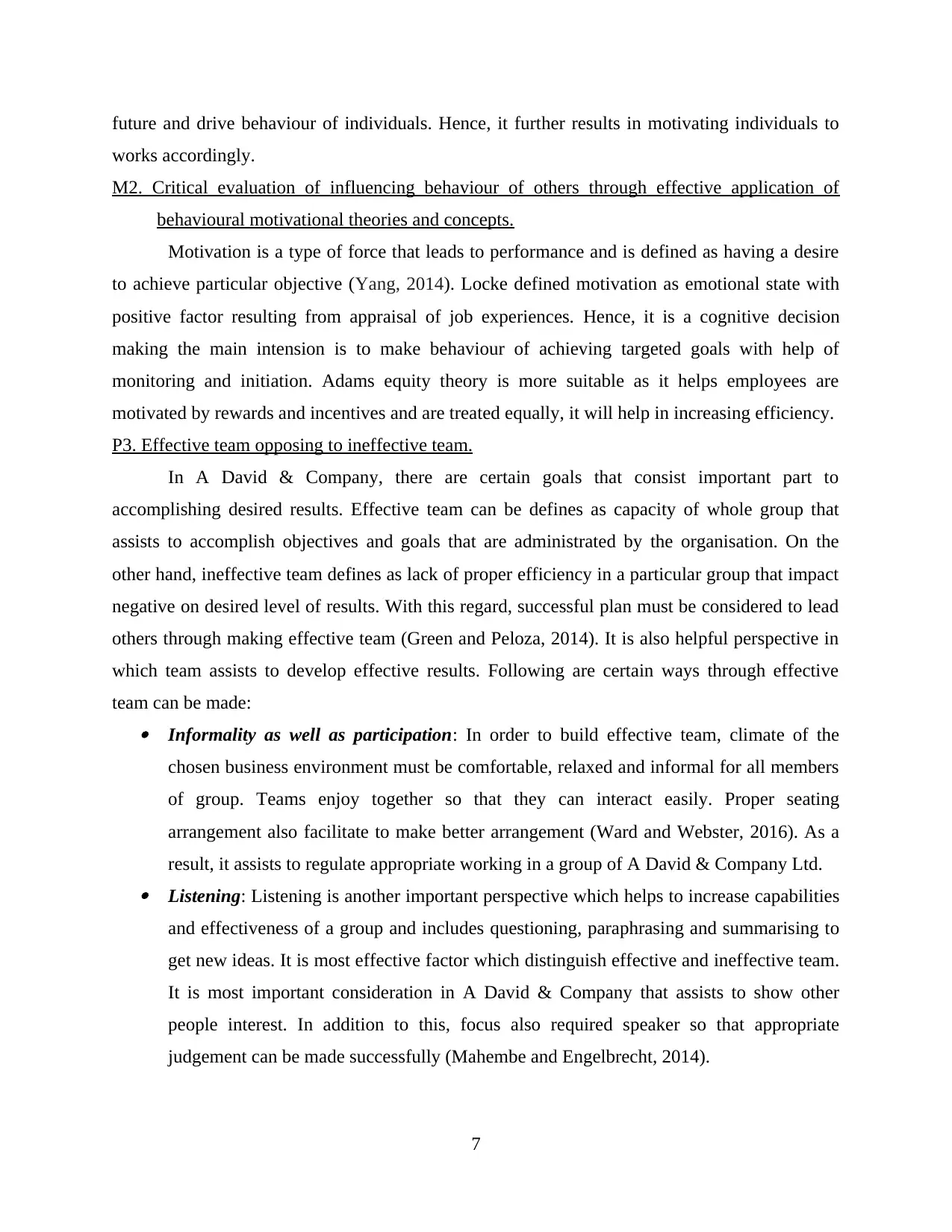
future and drive behaviour of individuals. Hence, it further results in motivating individuals to
works accordingly.
M2. Critical evaluation of influencing behaviour of others through effective application of
behavioural motivational theories and concepts.
Motivation is a type of force that leads to performance and is defined as having a desire
to achieve particular objective (Yang, 2014). Locke defined motivation as emotional state with
positive factor resulting from appraisal of job experiences. Hence, it is a cognitive decision
making the main intension is to make behaviour of achieving targeted goals with help of
monitoring and initiation. Adams equity theory is more suitable as it helps employees are
motivated by rewards and incentives and are treated equally, it will help in increasing efficiency.
P3. Effective team opposing to ineffective team.
In A David & Company, there are certain goals that consist important part to
accomplishing desired results. Effective team can be defines as capacity of whole group that
assists to accomplish objectives and goals that are administrated by the organisation. On the
other hand, ineffective team defines as lack of proper efficiency in a particular group that impact
negative on desired level of results. With this regard, successful plan must be considered to lead
others through making effective team (Green and Peloza, 2014). It is also helpful perspective in
which team assists to develop effective results. Following are certain ways through effective
team can be made: Informality as well as participation: In order to build effective team, climate of the
chosen business environment must be comfortable, relaxed and informal for all members
of group. Teams enjoy together so that they can interact easily. Proper seating
arrangement also facilitate to make better arrangement (Ward and Webster, 2016). As a
result, it assists to regulate appropriate working in a group of A David & Company Ltd. Listening: Listening is another important perspective which helps to increase capabilities
and effectiveness of a group and includes questioning, paraphrasing and summarising to
get new ideas. It is most effective factor which distinguish effective and ineffective team.
It is most important consideration in A David & Company that assists to show other
people interest. In addition to this, focus also required speaker so that appropriate
judgement can be made successfully (Mahembe and Engelbrecht, 2014).
7
works accordingly.
M2. Critical evaluation of influencing behaviour of others through effective application of
behavioural motivational theories and concepts.
Motivation is a type of force that leads to performance and is defined as having a desire
to achieve particular objective (Yang, 2014). Locke defined motivation as emotional state with
positive factor resulting from appraisal of job experiences. Hence, it is a cognitive decision
making the main intension is to make behaviour of achieving targeted goals with help of
monitoring and initiation. Adams equity theory is more suitable as it helps employees are
motivated by rewards and incentives and are treated equally, it will help in increasing efficiency.
P3. Effective team opposing to ineffective team.
In A David & Company, there are certain goals that consist important part to
accomplishing desired results. Effective team can be defines as capacity of whole group that
assists to accomplish objectives and goals that are administrated by the organisation. On the
other hand, ineffective team defines as lack of proper efficiency in a particular group that impact
negative on desired level of results. With this regard, successful plan must be considered to lead
others through making effective team (Green and Peloza, 2014). It is also helpful perspective in
which team assists to develop effective results. Following are certain ways through effective
team can be made: Informality as well as participation: In order to build effective team, climate of the
chosen business environment must be comfortable, relaxed and informal for all members
of group. Teams enjoy together so that they can interact easily. Proper seating
arrangement also facilitate to make better arrangement (Ward and Webster, 2016). As a
result, it assists to regulate appropriate working in a group of A David & Company Ltd. Listening: Listening is another important perspective which helps to increase capabilities
and effectiveness of a group and includes questioning, paraphrasing and summarising to
get new ideas. It is most effective factor which distinguish effective and ineffective team.
It is most important consideration in A David & Company that assists to show other
people interest. In addition to this, focus also required speaker so that appropriate
judgement can be made successfully (Mahembe and Engelbrecht, 2014).
7
⊘ This is a preview!⊘
Do you want full access?
Subscribe today to unlock all pages.

Trusted by 1+ million students worldwide
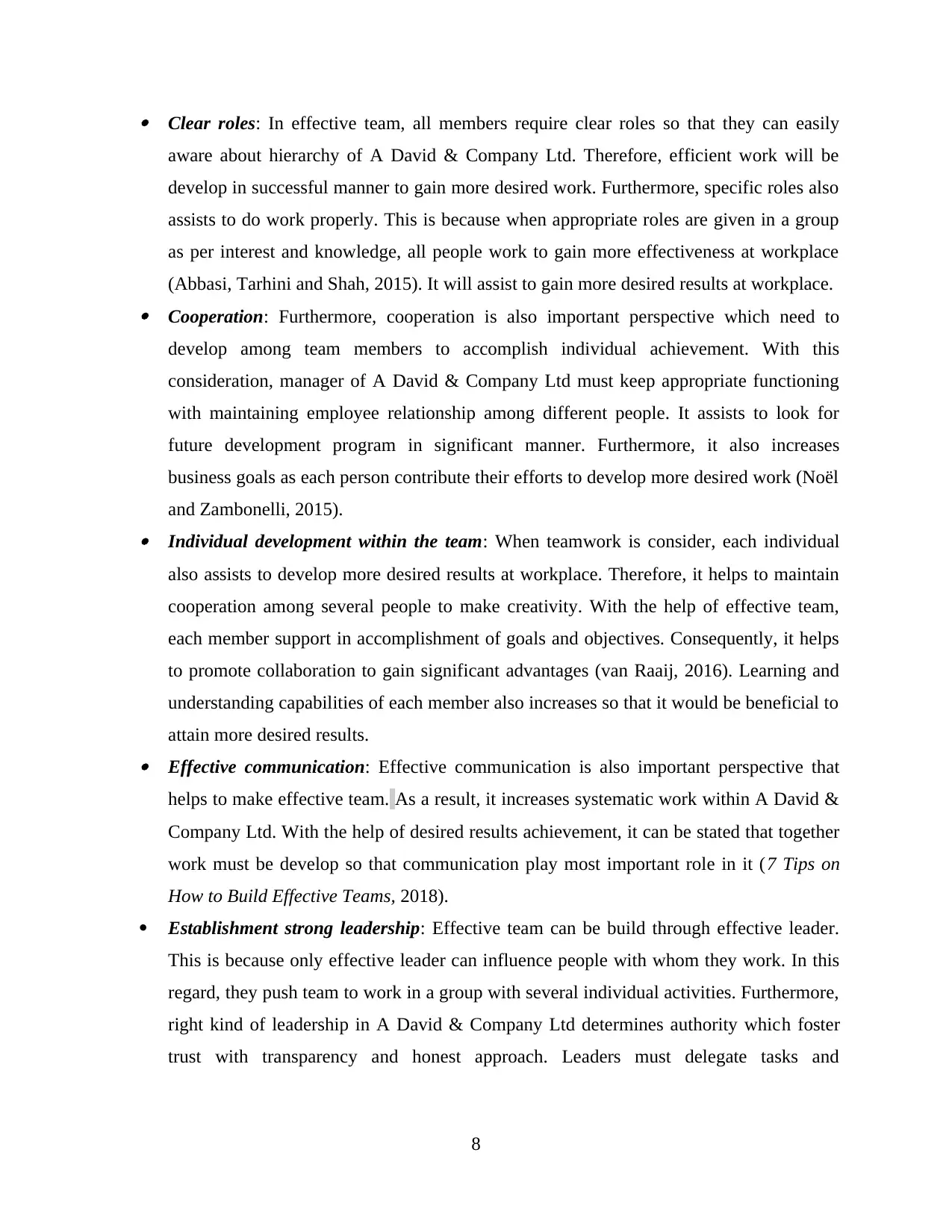
Clear roles: In effective team, all members require clear roles so that they can easily
aware about hierarchy of A David & Company Ltd. Therefore, efficient work will be
develop in successful manner to gain more desired work. Furthermore, specific roles also
assists to do work properly. This is because when appropriate roles are given in a group
as per interest and knowledge, all people work to gain more effectiveness at workplace
(Abbasi, Tarhini and Shah, 2015). It will assist to gain more desired results at workplace. Cooperation: Furthermore, cooperation is also important perspective which need to
develop among team members to accomplish individual achievement. With this
consideration, manager of A David & Company Ltd must keep appropriate functioning
with maintaining employee relationship among different people. It assists to look for
future development program in significant manner. Furthermore, it also increases
business goals as each person contribute their efforts to develop more desired work (Noël
and Zambonelli, 2015). Individual development within the team: When teamwork is consider, each individual
also assists to develop more desired results at workplace. Therefore, it helps to maintain
cooperation among several people to make creativity. With the help of effective team,
each member support in accomplishment of goals and objectives. Consequently, it helps
to promote collaboration to gain significant advantages (van Raaij, 2016). Learning and
understanding capabilities of each member also increases so that it would be beneficial to
attain more desired results. Effective communication: Effective communication is also important perspective that
helps to make effective team. As a result, it increases systematic work within A David &
Company Ltd. With the help of desired results achievement, it can be stated that together
work must be develop so that communication play most important role in it (7 Tips on
How to Build Effective Teams, 2018).
Establishment strong leadership: Effective team can be build through effective leader.
This is because only effective leader can influence people with whom they work. In this
regard, they push team to work in a group with several individual activities. Furthermore,
right kind of leadership in A David & Company Ltd determines authority which foster
trust with transparency and honest approach. Leaders must delegate tasks and
8
aware about hierarchy of A David & Company Ltd. Therefore, efficient work will be
develop in successful manner to gain more desired work. Furthermore, specific roles also
assists to do work properly. This is because when appropriate roles are given in a group
as per interest and knowledge, all people work to gain more effectiveness at workplace
(Abbasi, Tarhini and Shah, 2015). It will assist to gain more desired results at workplace. Cooperation: Furthermore, cooperation is also important perspective which need to
develop among team members to accomplish individual achievement. With this
consideration, manager of A David & Company Ltd must keep appropriate functioning
with maintaining employee relationship among different people. It assists to look for
future development program in significant manner. Furthermore, it also increases
business goals as each person contribute their efforts to develop more desired work (Noël
and Zambonelli, 2015). Individual development within the team: When teamwork is consider, each individual
also assists to develop more desired results at workplace. Therefore, it helps to maintain
cooperation among several people to make creativity. With the help of effective team,
each member support in accomplishment of goals and objectives. Consequently, it helps
to promote collaboration to gain significant advantages (van Raaij, 2016). Learning and
understanding capabilities of each member also increases so that it would be beneficial to
attain more desired results. Effective communication: Effective communication is also important perspective that
helps to make effective team. As a result, it increases systematic work within A David &
Company Ltd. With the help of desired results achievement, it can be stated that together
work must be develop so that communication play most important role in it (7 Tips on
How to Build Effective Teams, 2018).
Establishment strong leadership: Effective team can be build through effective leader.
This is because only effective leader can influence people with whom they work. In this
regard, they push team to work in a group with several individual activities. Furthermore,
right kind of leadership in A David & Company Ltd determines authority which foster
trust with transparency and honest approach. Leaders must delegate tasks and
8
Paraphrase This Document
Need a fresh take? Get an instant paraphrase of this document with our AI Paraphraser
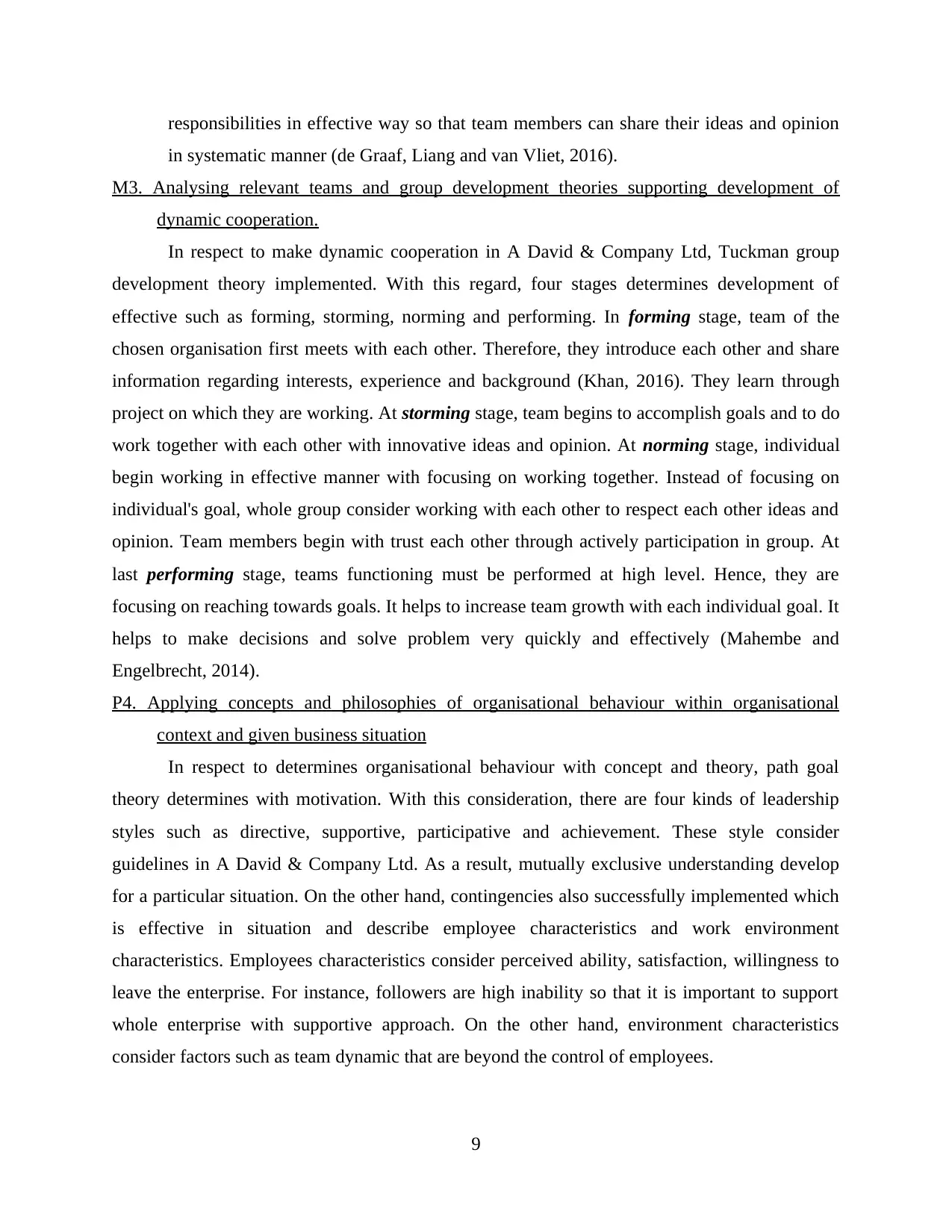
responsibilities in effective way so that team members can share their ideas and opinion
in systematic manner (de Graaf, Liang and van Vliet, 2016).
M3. Analysing relevant teams and group development theories supporting development of
dynamic cooperation.
In respect to make dynamic cooperation in A David & Company Ltd, Tuckman group
development theory implemented. With this regard, four stages determines development of
effective such as forming, storming, norming and performing. In forming stage, team of the
chosen organisation first meets with each other. Therefore, they introduce each other and share
information regarding interests, experience and background (Khan, 2016). They learn through
project on which they are working. At storming stage, team begins to accomplish goals and to do
work together with each other with innovative ideas and opinion. At norming stage, individual
begin working in effective manner with focusing on working together. Instead of focusing on
individual's goal, whole group consider working with each other to respect each other ideas and
opinion. Team members begin with trust each other through actively participation in group. At
last performing stage, teams functioning must be performed at high level. Hence, they are
focusing on reaching towards goals. It helps to increase team growth with each individual goal. It
helps to make decisions and solve problem very quickly and effectively (Mahembe and
Engelbrecht, 2014).
P4. Applying concepts and philosophies of organisational behaviour within organisational
context and given business situation
In respect to determines organisational behaviour with concept and theory, path goal
theory determines with motivation. With this consideration, there are four kinds of leadership
styles such as directive, supportive, participative and achievement. These style consider
guidelines in A David & Company Ltd. As a result, mutually exclusive understanding develop
for a particular situation. On the other hand, contingencies also successfully implemented which
is effective in situation and describe employee characteristics and work environment
characteristics. Employees characteristics consider perceived ability, satisfaction, willingness to
leave the enterprise. For instance, followers are high inability so that it is important to support
whole enterprise with supportive approach. On the other hand, environment characteristics
consider factors such as team dynamic that are beyond the control of employees.
9
in systematic manner (de Graaf, Liang and van Vliet, 2016).
M3. Analysing relevant teams and group development theories supporting development of
dynamic cooperation.
In respect to make dynamic cooperation in A David & Company Ltd, Tuckman group
development theory implemented. With this regard, four stages determines development of
effective such as forming, storming, norming and performing. In forming stage, team of the
chosen organisation first meets with each other. Therefore, they introduce each other and share
information regarding interests, experience and background (Khan, 2016). They learn through
project on which they are working. At storming stage, team begins to accomplish goals and to do
work together with each other with innovative ideas and opinion. At norming stage, individual
begin working in effective manner with focusing on working together. Instead of focusing on
individual's goal, whole group consider working with each other to respect each other ideas and
opinion. Team members begin with trust each other through actively participation in group. At
last performing stage, teams functioning must be performed at high level. Hence, they are
focusing on reaching towards goals. It helps to increase team growth with each individual goal. It
helps to make decisions and solve problem very quickly and effectively (Mahembe and
Engelbrecht, 2014).
P4. Applying concepts and philosophies of organisational behaviour within organisational
context and given business situation
In respect to determines organisational behaviour with concept and theory, path goal
theory determines with motivation. With this consideration, there are four kinds of leadership
styles such as directive, supportive, participative and achievement. These style consider
guidelines in A David & Company Ltd. As a result, mutually exclusive understanding develop
for a particular situation. On the other hand, contingencies also successfully implemented which
is effective in situation and describe employee characteristics and work environment
characteristics. Employees characteristics consider perceived ability, satisfaction, willingness to
leave the enterprise. For instance, followers are high inability so that it is important to support
whole enterprise with supportive approach. On the other hand, environment characteristics
consider factors such as team dynamic that are beyond the control of employees.
9
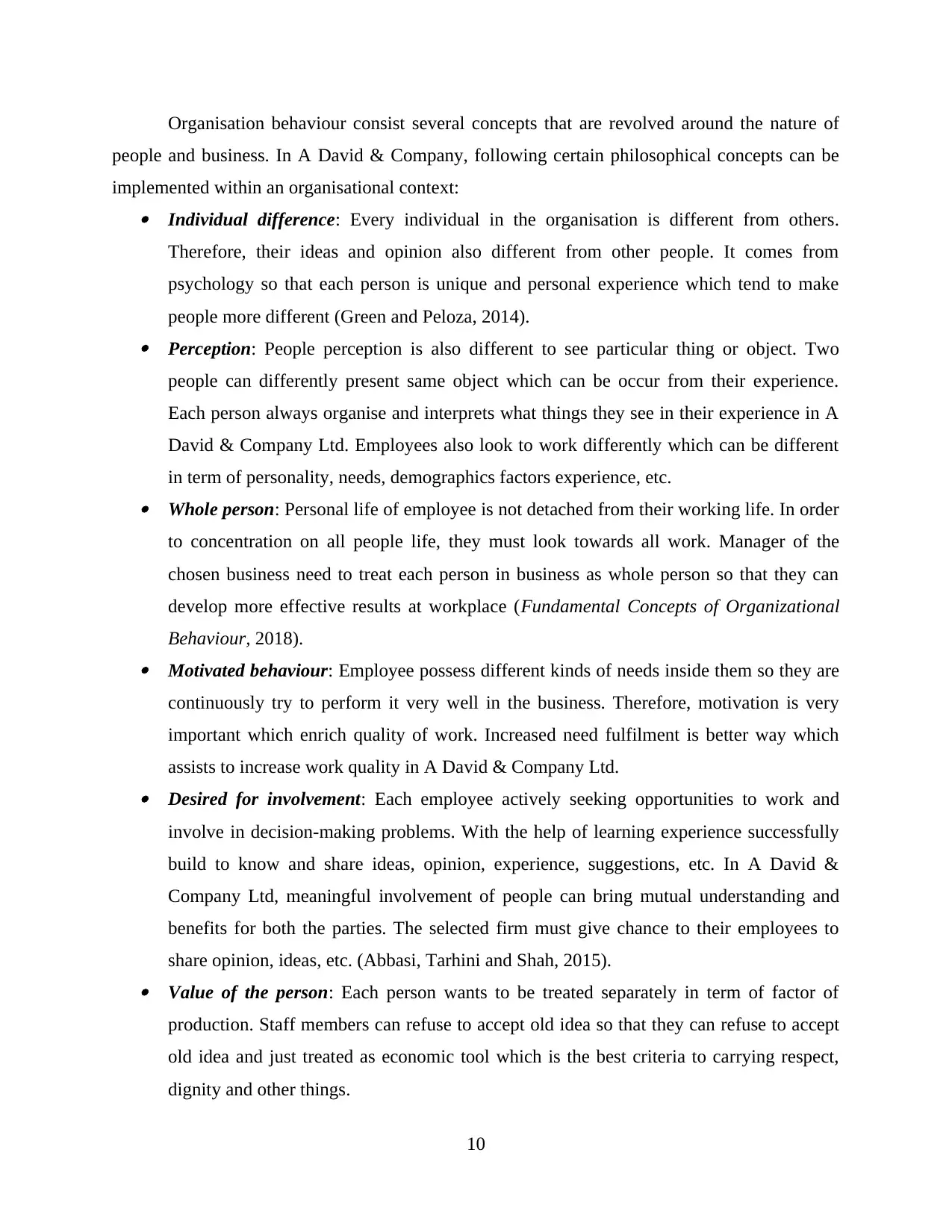
Organisation behaviour consist several concepts that are revolved around the nature of
people and business. In A David & Company, following certain philosophical concepts can be
implemented within an organisational context: Individual difference: Every individual in the organisation is different from others.
Therefore, their ideas and opinion also different from other people. It comes from
psychology so that each person is unique and personal experience which tend to make
people more different (Green and Peloza, 2014). Perception: People perception is also different to see particular thing or object. Two
people can differently present same object which can be occur from their experience.
Each person always organise and interprets what things they see in their experience in A
David & Company Ltd. Employees also look to work differently which can be different
in term of personality, needs, demographics factors experience, etc. Whole person: Personal life of employee is not detached from their working life. In order
to concentration on all people life, they must look towards all work. Manager of the
chosen business need to treat each person in business as whole person so that they can
develop more effective results at workplace (Fundamental Concepts of Organizational
Behaviour, 2018). Motivated behaviour: Employee possess different kinds of needs inside them so they are
continuously try to perform it very well in the business. Therefore, motivation is very
important which enrich quality of work. Increased need fulfilment is better way which
assists to increase work quality in A David & Company Ltd. Desired for involvement: Each employee actively seeking opportunities to work and
involve in decision-making problems. With the help of learning experience successfully
build to know and share ideas, opinion, experience, suggestions, etc. In A David &
Company Ltd, meaningful involvement of people can bring mutual understanding and
benefits for both the parties. The selected firm must give chance to their employees to
share opinion, ideas, etc. (Abbasi, Tarhini and Shah, 2015). Value of the person: Each person wants to be treated separately in term of factor of
production. Staff members can refuse to accept old idea so that they can refuse to accept
old idea and just treated as economic tool which is the best criteria to carrying respect,
dignity and other things.
10
people and business. In A David & Company, following certain philosophical concepts can be
implemented within an organisational context: Individual difference: Every individual in the organisation is different from others.
Therefore, their ideas and opinion also different from other people. It comes from
psychology so that each person is unique and personal experience which tend to make
people more different (Green and Peloza, 2014). Perception: People perception is also different to see particular thing or object. Two
people can differently present same object which can be occur from their experience.
Each person always organise and interprets what things they see in their experience in A
David & Company Ltd. Employees also look to work differently which can be different
in term of personality, needs, demographics factors experience, etc. Whole person: Personal life of employee is not detached from their working life. In order
to concentration on all people life, they must look towards all work. Manager of the
chosen business need to treat each person in business as whole person so that they can
develop more effective results at workplace (Fundamental Concepts of Organizational
Behaviour, 2018). Motivated behaviour: Employee possess different kinds of needs inside them so they are
continuously try to perform it very well in the business. Therefore, motivation is very
important which enrich quality of work. Increased need fulfilment is better way which
assists to increase work quality in A David & Company Ltd. Desired for involvement: Each employee actively seeking opportunities to work and
involve in decision-making problems. With the help of learning experience successfully
build to know and share ideas, opinion, experience, suggestions, etc. In A David &
Company Ltd, meaningful involvement of people can bring mutual understanding and
benefits for both the parties. The selected firm must give chance to their employees to
share opinion, ideas, etc. (Abbasi, Tarhini and Shah, 2015). Value of the person: Each person wants to be treated separately in term of factor of
production. Staff members can refuse to accept old idea so that they can refuse to accept
old idea and just treated as economic tool which is the best criteria to carrying respect,
dignity and other things.
10
⊘ This is a preview!⊘
Do you want full access?
Subscribe today to unlock all pages.

Trusted by 1+ million students worldwide
1 out of 17
Related Documents
Your All-in-One AI-Powered Toolkit for Academic Success.
+13062052269
info@desklib.com
Available 24*7 on WhatsApp / Email
![[object Object]](/_next/static/media/star-bottom.7253800d.svg)
Unlock your academic potential
Copyright © 2020–2025 A2Z Services. All Rights Reserved. Developed and managed by ZUCOL.





